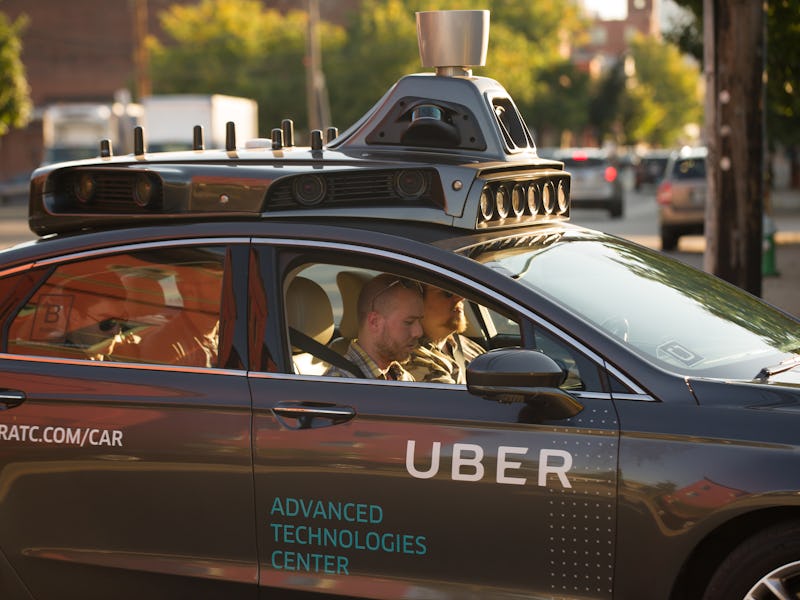Why Are Auto Execs on a Self-Driving Advisory Council, Anyway?
A consumer watchdog says they need to go.

Jamie Court really wants Donald Trump to do his thing: Fire Mary Barra.
Barra’s CEO of General Motors and head of the Advisory Committee on Automation and Transportation the Department of Transportation-formed group to advise the federal government on how to deal with self-driving cars. And Court’s president of Consumer Watchdog, self-described “nationally-recognized, California-based, non-profit consumer education and advocacy organization.”
The Court-Barra battle is one of the early, and probably eventually hundreds, of regulatory fights over autonomous cars.
Court thinks Barra’s day job should disqualify her from being on the advisory committee, which serves as a “critical resource” for the government to frame federal policy on self-driving cars. This puts Barra in the enviable position of having her voice heard early when it comes to the government’s regulation on self-driving cars. Over the next decade, Court says self-driving cars are going to make Barra a whole lotta money: it’s a classic, unavoidable conflict of interests.
The U.S. Department of Transportation set up the committee in October of 2016 to create a council of “individuals with cross-modal perspectives” for self-driving cars, robotics, shipping, and the FAA’s Next Generation technology.
Barra leads a Fortune 500 company; her expertise is in making money and running a massive international business, not in autonomous systems. And those interests, Court says, are what make her and her peers a problem for American consumers who will be buying, driving, and living alongside autonomous cars. In January, Court penned a letter to Trump, asking him to fire Barra as soon as he got into office.
Jamie Court of Consumer Watchdog
Why should Trump fire Barra from the DOT’s advisory committee?
Court: The interests of the auto industry is always in no regulation, and they are in charge of the advisory committee to determine that regulation. Barra has a conflict of interest between the fiduciary responsibility to her shareholders and to consumers. It’s an irreconcilable conflict and her position is a total gift to the industry. We know this autonomous technology is not ready for prime time. Carmakers don’t want to be transparent for the dangers, and they sure don’t want to be accountable to the public for making sure that it’s safe. It’s like putting a hospital in charge of regulation of the hospital industry.”
GM is currently testing autonomous vehicles on public roads in San Francisco and Arizona, and video footage of it’s “Albatross” car, a modified Chevy Volt, cruising the streets pops up on YouTube occasionally. On Tuesday, GM and Toyota petitioned a House of Representatives committee to loosen up regulations on self-driving cars, and increase the cap in autonomous testing exemptions for vehicles on public roads. Trump’s new head of the Department of Transportation, Elaine Chao, has been silent so far on the issue of autonomous cars, but the advisory committee, established under during the Obama administration, is still functioning to guide the process. Barra’s co-chair is Eric Garcetti, mayor of Los Angeles, who Court describes as a “know-nothing.” The advisory committee also includes other dignitaries of the auto industry, like Robin Chase, co-founder of Zipcar; Waymo CEO John Krafcik; Lyft co-founder and president John Zimmer; and Rachel Holt, a regional general manager for Uber.
What’s the middle ground between someone who doesn’t have that conflict of interest and still knows the industry and technology well enough?
Court: The middle ground is a technologist or a consumer advocate or a public official who has the public’s interests at heart. This entire panel, essentially, is industry players who are profiting from the technology. There’s not a single consumer group, public interest group, car safety group, this is all-industry. You might as well call it the chamber of commerce, because it doesn’t have any governmental role here except for some academics, who may know a lot, but don’t exactly feel emboldened to articulate in the way that a public official or a public interest group or a consumer group would. I think there’s plenty of third parties who can comprehend the technology and aren’t beholden to the investors.
While Barra and Garcetti lead the committee, it does have some representation from the type of public interest groups Court mentioned, like the Community Living Policy Center, the National Safety Council, and the American Trucking Association, along with a handful of other public servants and more than a few academics.
As a consumer advocate, what steps might the committee take?
Court: We’re hoping that the president fires them and starts with some new apprentices. But if they go forward, it’s a blank check. We might as well not have any committee anyway because it’s just going to do exactly what the industry says. I’m feeling that the president needs to understand that there are tens of millions of jobs at stake here, and that should get him to want to take a look at this from a different perspective.
Have you had any response from the government to the letter?
Nothing. Silence. But we’re just getting going, is all.
Questions and answers have been edited for clarity and brevity.